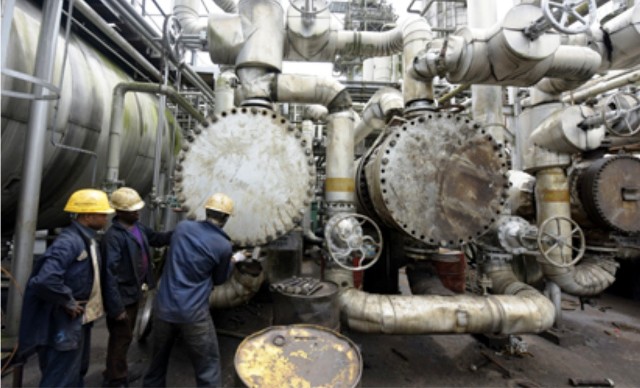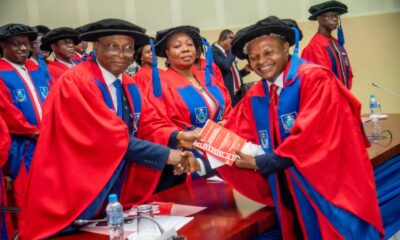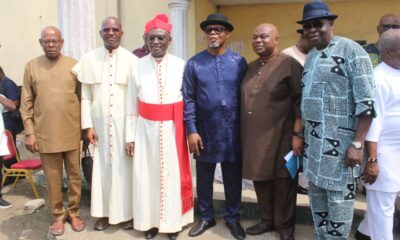Business
Inflation, Interest Rates Fall
Indications emerged at the weekend that the current banking sector reforms and the relative stability in the prices of crude oil may have returned Nigeria to the path of economic stability with the remarkable reduction in inflation and interest rates.
The nation’s annual interest rates fell from 11 per cent in August to 10.4 per cent in September, thus raising the prospect of stability in the nation’s economy.
Data released by the National Bureau of Statistics at the weekend showed that the nation’s annual inflation dropped to 10.4 per cent on a 12-month basis in September from 11 per cent in August.
“The composite consumer price index or CPI rose 10.4 per cent year-on-year in September 2009 and it is slower than the 11 per cent increase recorded in the previous month,” the agency said in a report, giving no reason for the decrease.
“The monthly change of the CPI was 0.5 per cent increase in September 2009,” it added.
According to the bureau, the urban All Items Index rose by 0.2 per cent while the corresponding Rural Index increased by 0.7 per cent in September, when compared with the preceding month.
The bureau stated that the year-on-year average consumer price level as at September 2009 for urban and rural dwellers rose by 8.1 per cent and 11.5 per cent respectively.
Nigerian inflation had risen steadily since the second quarter of last year, standing at 9.7 per cent in May before soaring to 14 per cent in July owing to the effects of the global food crisis.
The Federal Government had managed to slow inflation for most of 2006 and 2007 through belt-tightening measures to achieve a single-digit rate.
Such measures included a stable exchange rate for the national currency, as well as fiscal discipline.
Checks also showed that the CBN intervention has also forced down interest rates which was pegged at 21 per cent earlier in the year. Interest rate now hovers between 18.85 and 19.89 per cent.
According to the latest figures posted on the Money Market Association site, Prime Lending rate stood at 18.85 while Normal lending was put at 19.85 per cent respectively.
In specific terms, the Nigerian Interbank Offer Rate (NIBOR) for call fell to 4.75 per cent by the end of last week from 10.37 per cent at which it closed the previous week ended October 9, 2009.
The 7-day NIBOR closed the week at 7.41 per cent from 12.50 per cent. The 90-day paper closed the week at 13 per cent from 16 per cent, while 180 day instrument dropped to 14.50 per cent as against 17.58 per cent the previous week.
Explaining the trading for last week, Head, Treasury Sales, Fidelity Bank Plc, Mr. Uvic Ogban said that the N200 billion bailout funds released to the second batch of troubled banks hit the system last week Thursday, thereby dragging down the rates.
“The market responded to the bailout fund. The other influence on the rates was the anticipation by dealers that the market will be awash with funds up till this week. The meeting of the Federation Account and Allocation Committee (FAAC) was held last week. It is expected that the fund will hit the system in the current week. In addition to the inflow expected from the economic stimulus package. Since the market respond to information, the foregoing will help sustain the low rates in the current week,” he said.
During an interactive session with journalists at the recently concluded World Bank/ International Monetary Fund (IMF) meetings in Istanbul, Turkey, CBN Governor, Lamido Sanusi, said the banking watchdog has been able to achieve macroeconomic stability, especially with both the exchange and interest rates.
He noted that when he became the CBN governor last June, inflation rate was 15 per cent but as at end of August, it had fallen to 11 per cent.
Sanusi said inflation was likely to go to nine per cent by the end of the year.
“When I became governor of Central Bank, inflation rate was 15 per cent. End of August, it was 11 per cent. The gap between the official rate and parallel rate was 25 per cent: as at today, it is 2.98 per cent. All short term money market rates today are lower than they were in December 2008.
“We’ve delivered macroeconomic stability. We’ve checked stable exchange rate-in fact, in the last one week; I have been fighting against the rapid appreciation of the naira because of return in confidence. It’s just that in the management of the macro economy, the CBN has been so successful and we’ve done all of these in the middle of all those financial turmoil.
“There’s been no spike on inter-bank rates. There’s been no spike on exchange rates. There’s been no capital flight and inflation has not gone up. Those are the facts the president mentioned in his Independence Day speech: Those achievements of his administration nobody talks about. Inflation is likely to go to nine per cent by the end of the year. Look at our exchange reserves, the foreign reserves- we stemmed the outflow: we were losing foreign reserves at the rate of $2 billion per month. In the last two months we have lost nothing,” he said.
Business
IPMAN Wants Marketers To Patronize PH Refinery

Business
Customs To Facilitate Trade, Generate Revenue At Industrial Command






